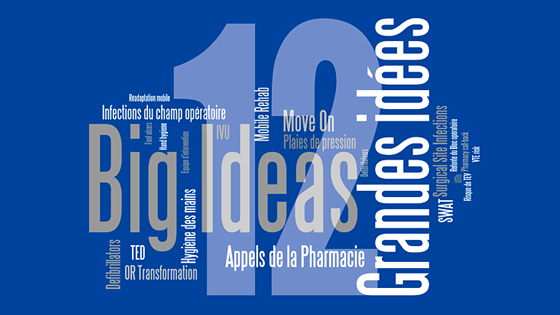
Celebrate TOH’s 12 Big Ideas
At TOH, we never stop looking for innovative ways to improve the delivery of patient care. We constantly seek new ways to make the hospital experience of our patients and their families easier and more compassionate. In fact, we’re recognized leaders on many fronts.
As 2013 came to a close, we highlighted 12 game-changing ideas – we’re calling them “Big Ideas” – that have improved patient care or experience at TOH.
Here is the next Big Idea: Get deconditioned patients into rehab sooner.
What’s the Big Idea?
All that time spent in a hospital bed can be hazardous to the health of even the sickest patients, a growing body of research shows.
Immobility saps muscle strength and aerobic capacity while increasing the risk of blood clots, bed sores and pneumonia. Immobility can also increase the risk of depression.
A TOH pilot program aims to get deconditioned patients of all ages back on their feet and ready for rehabilitation sooner.
What’s the impact on patients?
Since it was launched in September, the Mobile Rehab Team has taken physiotherapy, occupational therapy and psychosocial support to the bedsides of heart-transplant patients as well as those who’ve spent weeks in the intensive-care unit.
Many of these patients, despite surviving life-threatening injuries or illnesses, face a steep recovery. Therapists work to get patients out of bed, walking and performing the daily tasks of bathing, dressing and feeding themselves.
Why should you care?
Studies in the Netherlands and Australia, which pioneered mobile rehab programs, have shown that identifying and helping deconditioned patients early on speeds their admission into rehabilitation programs. It can also shorten their acute-care stay dramatically – by an average of 10 days, according to early TOH data.
“We provide a treatment plan to make patients rehab-ready, which gives them a smoother transition earlier,” said Sherry Daigle, Clinical Manager of Locomotor Care at TOH Rehabilitation Centre, which launched the pilot project.
The team is made up of an RN who screens patients, a physiatrist, a physiotherapist, an occupational therapist and, as needed, a psychologist and social worker. They work to restore resilience to the body – and to the mind – in preparation for more intensive rehab.

Support patient care and research at
The Ottawa Hospital


 To reset, hold the Ctrl key, then press 0.
To reset, hold the Ctrl key, then press 0.